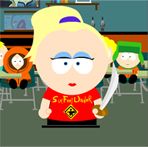| View previous topic :: View next topic |
| Author |
Message |
flutieflakes
Joined: 16 Mar 2003
|
 Posted: Thu Apr 17, 2003 8:59 pm Post subject: Posted: Thu Apr 17, 2003 8:59 pm Post subject: |
 |
|
| as a former esl teacher in toronto (one of the biggest esl populations in the world), bingos are seen as highly effective tools to use in learning new vocabulary.... |
|
| Back to top |
|
 |
Tancred

Joined: 15 Jan 2003
Location: Upon a mountain in unknown Kadath
|
 Posted: Fri Apr 18, 2003 7:10 pm Post subject: Posted: Fri Apr 18, 2003 7:10 pm Post subject: |
 |
|
| i am actually very pro-Bingo and pro-games when they relate to the lesson at hand. I mean, let's face it...the children learn a lot more when they're having fun doing it...and i don't think bingo is any exception. Repition is the key...when they constantly identify a word with a picture or vice versa, eventually they will simply remember that word... |
|
| Back to top |
|
 |
tomato

Joined: 31 Jan 2003
Location: I get so little foreign language experience, I must be in Koreatown, Los Angeles.
|
 Posted: Sat Apr 19, 2003 12:22 am Post subject: Posted: Sat Apr 19, 2003 12:22 am Post subject: |
 |
|
Hello, Saint Moi!
And thank you for your inquiry!
If I understand correctly, you were asking how a bingo game fits into an ESL class. I shall use my noun bingo game as an example.
For the kids who are starting from ground level, I pass out bingo boards with pictures on them and show cards with pictures on them. When I show a picture of a kangaroo, I say, "This is a kangaroo."
After enough repetitions of the easy way, I hope that they have learned the words. So I see if they do. Instead of showing the pictures, I only show the words.
After enough repetitions of the second step, I hope that they have learned to read the words. So I see if they do. At this point, I not only show the word without the picture, I pass out bingo boards containing words without pictures.
This pattern is applicable not only to nouns, but to other parts of speech also. |
|
| Back to top |
|
 |
OiGirl

Joined: 23 Jan 2003
Location: Hoke-y-gun
|
 Posted: Thu Jan 29, 2004 3:19 pm Post subject: In Justification of BINGO Posted: Thu Jan 29, 2004 3:19 pm Post subject: In Justification of BINGO |
 |
|
More BINGO!
You can review this thread and see that I like a good serious BINGO game now and then.
Anyone have any ideas on how to explain this pedagogically? How does our use of BINGO in the classroom reflect your knowledge of language acquisition?
After giving a receptive and productive vocabulary test, I may be able to make statements like,
-This student needs to further develop her vocabulary in the area of... (clothing, food, animals, etc.)
-This student has some productive vocabulary but lacks receptive language. (The productive student could be the caller.)
Any further justificatons of this godsend teaching method? |
|
| Back to top |
|
 |
ryleeys

Joined: 22 Dec 2003
Location: Columbia, MD
|
 Posted: Thu Jan 29, 2004 3:55 pm Post subject: Posted: Thu Jan 29, 2004 3:55 pm Post subject: |
 |
|
I haven't played bingo in over a month with my kids... I've used hangman a few times just to fill out the last 5 minutes of a class that did really well and finished early. Actually, the first time they stopped guessing random letters and realized I was using words from the lesson (and then "cheated" by looking in the book), I was happy.
Truthfully, I don't like to play games with my kids... not for any philosophical reasons, but because it takes me so long to get them settled down, I don't wanna just rile them up again. |
|
| Back to top |
|
 |
schwa
Joined: 18 Jan 2003
Location: Yap
|
 Posted: Thu Jan 29, 2004 8:06 pm Post subject: Posted: Thu Jan 29, 2004 8:06 pm Post subject: |
 |
|
Okay then all, whats your take on wordsearches?
When I first got into this biz, my predecessor had 20 minutes to 'orient' me. 90% of his methodology seemed to involve wordsearches -- "Kids like them. Keeps them quiet." True enough, but I'm ashamed to reflect on how much I overdepended on them those first months.
It finally dawned on me that kids like them because they dont have to think. They are 99% useless pedagogically.
The one percent might include that brief stage when kids are learning upper & lower case (clues in one form, grid in the other). Or maybe a bit of vocab recognition so long as you dont provide a list of the words theyre to find.
Otherwise, imho, an utter waste of time. |
|
| Back to top |
|
 |
Son Deureo!
Joined: 30 Apr 2003
|
 Posted: Thu Jan 29, 2004 10:20 pm Post subject: Posted: Thu Jan 29, 2004 10:20 pm Post subject: |
 |
|
| One way to make word searches a bit more educational is to make the clues something that makes them think about the meaning of the vocab words in the puzzle, such as picture clues or clues in Korean. |
|
| Back to top |
|
 |
crazylemongirl

Joined: 23 Mar 2003
Location: almost there...
|
 Posted: Thu Jan 29, 2004 10:54 pm Post subject: Posted: Thu Jan 29, 2004 10:54 pm Post subject: |
 |
|
I think in the end classroom activities such as word searches, bingo etc. are only useful when they are tied into your lesson objectives rather than being the lesson objectives in and of themselves.
I think that's what seperates the slackers from the educators.
clg |
|
| Back to top |
|
 |
Ya-ta Boy
Joined: 16 Jan 2003
Location: Established in 1994
|
 Posted: Fri Jan 30, 2004 12:53 am Post subject: Posted: Fri Jan 30, 2004 12:53 am Post subject: |
 |
|
One more way to use Bingo as a motivator and 'crowd control' technique is to divide the class into teams at the start of the period. Give points to the teams for answering questions during the class, bonus points for good behavior, etc. Each X or O is worth 3 points.
Near the end of class count up the points. X team may have only enough points to 'buy' 3 Xs, which puts them at a disadvantage if the O team members answered more questions and behaved well that day.
It takes no prep time.  |
|
| Back to top |
|
 |
OiGirl

Joined: 23 Jan 2003
Location: Hoke-y-gun
|
 Posted: Sun Feb 01, 2004 2:30 pm Post subject: Posted: Sun Feb 01, 2004 2:30 pm Post subject: |
 |
|
| schwa wrote: |
Okay then all, whats your take on wordsearches?
When I first got into this biz, my predecessor had 20 minutes to 'orient' me. 90% of his methodology seemed to involve wordsearches -- "Kids like them. Keeps them quiet." True enough, but I'm ashamed to reflect on how much I overdepended on them those first months.
It finally dawned on me that kids like them because they dont have to think. They are 99% useless pedagogically.
The one percent might include that brief stage when kids are learning upper & lower case (clues in one form, grid in the other). Or maybe a bit of vocab recognition so long as you dont provide a list of the words theyre to find.
Otherwise, imho, an utter waste of time. |
I make really hard wordsearches. First, no word lists! When you give them a word list, the pedagogical value flies out of the window. (Of course, some people could not care less about this.) For very low students, I might use pictures, but most of my worksearches have clues like "five words to describe a person's weight," or "four words to describe hair color." I have also made word searches where students had to find pairs of intersecting words, for example opposites, different verb forms, or two words that other wise went together (cup/coffee, bedroom/dresser, read/magazine). |
|
| Back to top |
|
 |
mithridates

Joined: 03 Mar 2003
Location: President's office, Korean Space Agency
|
 Posted: Mon Feb 02, 2004 3:39 am Post subject: Posted: Mon Feb 02, 2004 3:39 am Post subject: |
 |
|
Bingo's pretty good, and it's adaptable. An easy way to make it harder is present tense/past tense bingo, or opposite bingo.
Eg:
Teacher yells out dark, and students get to cross out light if they have it.
Or teacher yells out fight and students have to cross out fought. |
|
| Back to top |
|
 |
|

